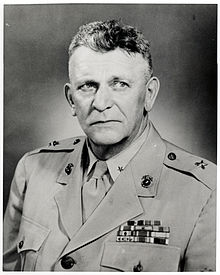Harry B. Liversedge
| Harry Bluett Liversedge | |
|---|---|

BGen Harry B. Liversedge
|
|
| Nickname(s) | "Harry the Horse" |
| Born |
September 21, 1894 Volcano, California |
| Died | November 25, 1951 (aged 57) Bethesda, Maryland |
| Allegiance |
|
| Service/branch |
|
| Years of service | 1917–1951 |
| Rank |
|
| Commands held |
2nd Battalion 8th Marines 3rd Raider Battalion 1st Marine Raider Regiment 28th Marines Fleet Marine Force, Guam Marine Corps Reserve |
| Battles/wars |
World War I *France 1918–1919 Banana Wars *Haiti 1922 World War II *Battle of Iwo Jima |
| Awards |
Navy Cross (2) Bronze Star |

Liversedge at the selection for the 1919 Inter-Allied Games
|
||||||||||||||||
| Sport | ||||||||||||||||
|---|---|---|---|---|---|---|---|---|---|---|---|---|---|---|---|---|
| Sport | Athletics | |||||||||||||||
| Event(s) | Shot put, javelin throw | |||||||||||||||
| Club | U.S. Army; California Golden Bears, Berkeley |
|||||||||||||||
| Achievements and titles | ||||||||||||||||
| Personal best(s) | SP – 14.41 m (1924) JT – 56.33 m (1914) |
|||||||||||||||
|
Medal record
|
||||||||||||||||
Brigadier General Harry Bluett Liversedge (September 21, 1894 – November 25, 1951), whose regiment figured in the historic raising the flag on Iwo Jima, was a United States Marine who died in 1951 after almost 25 years of service. His last assignment was as Director of the Marine Corps Reserve.
The former Olympic track star was awarded his second Navy Cross for extraordinary heroism as commander of the 28th Marine Regiment at the Battle of Iwo Jima. He had won his first while leading the crack 1st Marine Raider Regiment in the tough jungle fighting on New Georgia. The citation for the second Navy Cross states in part:
"Landing on the fire-swept beaches 22 minutes after H-Hour, (the then) Colonel Liversedge gallantly led his men in the advance inland, executing a difficult turning maneuver to the south, preparatory to launching the assault on Mount Suribachi.."
Two decades prior, the name of Liversedge was familiar one in sports page headlines, when as a member of the Naval Academy track squads, he participated in the 1920 and 1924 Olympic Games. He also figured prominently in football as a member of the championship Marine football teams of the early 1920s.
General Liversedge began his career in May 1917, when he enlisted as a private, and was commissioned a second lieutenant in September 1918. He was promoted to first lieutenant in July 1919 while serving with the Fifth Brigade in France.
Following his return to the United States in August 1919, he was ordered to the Marine Barracks, Quantico, Virginia, but shortly thereafter was assigned to the Second Provisional Marine Brigade at Santo Domingo, Dominican Republic, arriving in October of that year. In April of the following year he was returned to the United States and played football in the Army-Marine Corps game at Baltimore, Maryland.
...
Wikipedia
